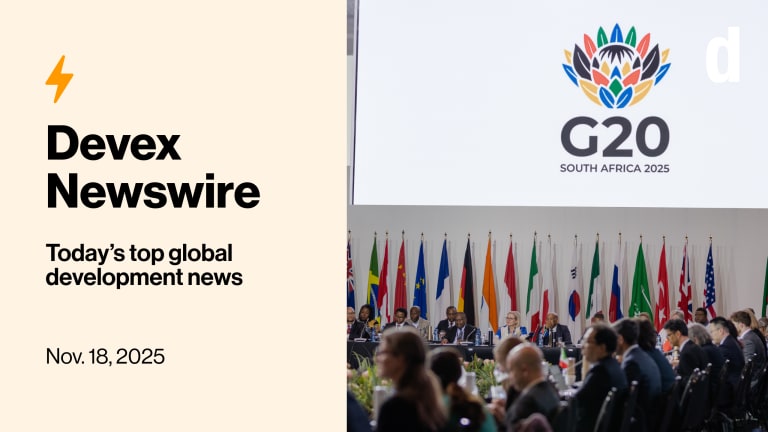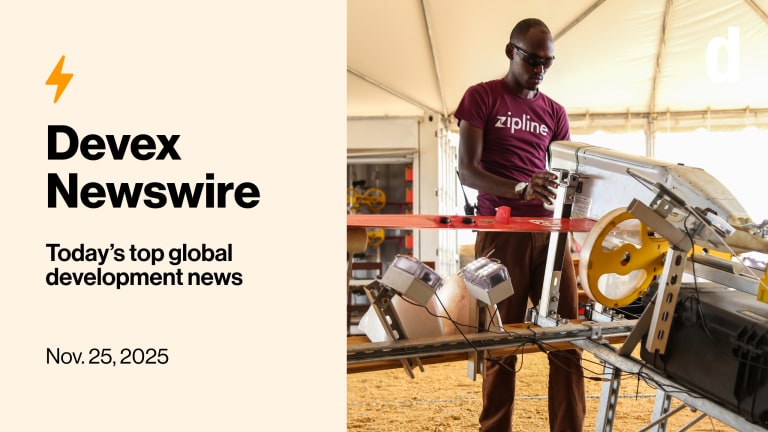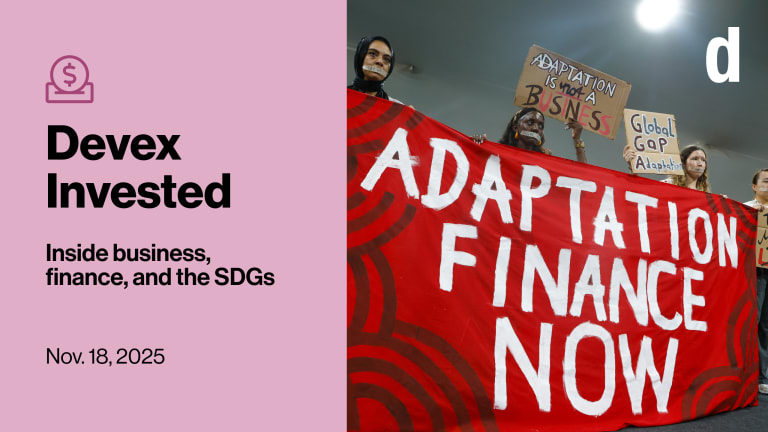
World leaders gathered last week in Johannesburg, South Africa, and across the planet in Belém, Brazil, reflecting and trying to chart a path forward. The outcomes of both the Group of 20 leaders’ summit and the United Nations Climate Change Conference, or COP30, seem to have fallen short, as these large summits often do.
But one theme they had in common: pushing ahead even when the U.S. opts out. As my colleague Elissa Miolene reports, although G20 leaders in Johannesburg reached an agreement on a declaration, many wondered whether it was more symbolism than real change.
“This is a victory for the diplomatic process, but doesn’t really move the needle on policy substance,” Gilad Isaacs, the executive director of the Institute for Economic Justice, tells her.
At the top of the G20 agenda were debt and the cost of capital. At the G20 leaders’ summit last weekend, heads of state largely stuck to existing commitments on debt: They reaffirmed support for the G20 Common Framework on debt treatments and failed to take up any of the major reforms provided by a G20-commissioned expert panel earlier this month, including a new refinancing initiative that provides low-cost loans that would allow countries to repurchase foreign currency debt which is trading at a discount on the secondary markets, Elissa reports.
“We had four consecutive global south presidencies, but the outcome is rather disappointing,” says Bodo Ellmers, the managing director of the Global Policy Forum Europe. “One had hoped that this exceptional series would lead to tangible outcomes that elevate the role of the global south in global governance, but the revolution failed to materialize.”
Still, the G20 declaration acknowledged Africa’s rising debt pressures and high borrowing costs — and many countries from across the world took note. Throughout the year, South Africa raised the continent’s cost of capital issue, and hammered the fact that the credit ratings of African nations are often weighted with perceived risk. The bloc also launched the Africa Engagement Framework, a new initiative meant to anchor G20-Africa cooperation with African financial issues. South Africa committed to backing the initiative until 2030.
“I think there was a realization that there’s only so much we can achieve this year, and there are obviously positive, incremental elements to what is there,” says Elizabeth Sidiropoulos, the chief executive of the South African Institute of International Affairs. “There are things that we can do as Africans, or as developing countries, in terms of addressing some of these challenges.”
Read: G20 summit in South Africa adopts declaration without the US
ICYMI: G20 panel calls for a new debt refinancing plan for low-income nations
Read our recap of the summit: What the G20’s decisions mean for the world
A new idea
While at the helm of the G20, South Africa also pushed for more sovereign wealth funds – particularly on the African continent. For years the country has been pushing for its own sovereign wealth fund — which are typically pools of excess revenues that are then invested to generate long-term returns, Elissa reports.
“How can we expect our people to come and invest in us if we don’t invest in ourselves?” asks Maxwell Gomera, the U.N. Development Programme’s resident representative in South Africa. “That signal changes everything.”
In my mind it’s a bit of a puzzling push because many African nations lack the reserves to stand up such sovereign wealth funds. But Elissa explains that the plan was fleshed out at the G20 Social Summit by reps from UNDP, the Development Bank of Southern Africa, and others. The Pan-African sovereign wealth fund, they say, would function as a “continent-wide investment vehicle” that pools financial resources from multiple African states and regional development finance institutions.
In the case of the Pan-African sovereign wealth fund, those returns would work to stabilize countries against financial volatility, finance regional infrastructure, invest in renewable energy, and more.
So how would it be paid for? Those behind the sovereign wealth fund laid out a menu of options in Johannesburg, from carbon-credit monetization to blockchain-based funding to diaspora investment platforms and beyond, Elissa reports.
The underlying issue — more capital for the continent, and at a lower cost — popped up a lot in the past week. I was struck by a LinkedIn post from Misheck Mutize, the lead expert on country support on credit ratings agencies at the African Union, who wrote that credit ratings and the cost of capital “cut through the noise” with greater acknowledgement that African credit ratings have a “prejudice premium.”
“The information ecosystem has been democratised and analysts must evolve. Not by defending outdated positions, but by sharpening their methods, engaging broader voices, embracing transparency, and recognising that credibility is earned in a competitive marketplace of ideas,” he writes.
And we did see at least one big ratings change: South Africa was upgraded for the first time in about two decades shortly before the summit.
Read: South Africa wins credit rating boost after two decades
A look ahead: What does the United States’ G20 presidency mean for the world?
As for COP30 …
The climate conference wrapped up after some eleventh-hour drama with a final text that left out fossil fuels and had weak language on adaptation finance, my colleague Jesse Chase-Lubitz reports.
While it does include a call to triple adaptation finance to $120 billion, it pushed the deadline to 2035 (an earlier draft had said 2030), and it doesn’t say that wealthy countries need to pay up.
So who would pay? There was a lot of talk about the private sector’s role in financing adaptation, but Sierra Leone’s Climate and Environment Minister Jiwoh Abdulai pushed back on that premise.
“The private sector does not work for adaptation. … If it worked, we wouldn’t be here,” he tells my colleague Ayenat Mersie. “I would like someone to tell me where it has worked. Maybe at some point, the private sector will come in. But it hasn’t so far, and there’s a reason for that.”
Read: The 3 big outcomes of COP30’s final plenary (Pro)
See also: Sierra Leone challenges COP30 push for private-sector to fund adaptation
And don’t miss our wrap-up: What moved, what stalled, and what’s next after COP30
+ Stay ahead in this crucial time for global development by signing up for a Devex Pro membership with a 15-day free trial today and gain unlimited access to all our expert analyses and events, insider briefings, funding data and opportunities, regularly updated career resources, and more.
Climate at the core
While the Asian Development Bank has seemed to keep a low profile in its climate work lately, Albert Park, its chief economist, tells Devex that the U.S. rejection of climate change and related vocabulary encouraged the bank to “really think hard about how the climate agenda supports the real development needs” of its member countries.
While the U.S., a major ADB shareholder, has expressed support for multilateral development banks, it has urged them to return to their “core missions.” So ADB looked at its core mission — poverty reduction and improving the quality of life of the people in its member states — and found that climate-related assistance was consistent with that mission.
“When we go around and talk to developing member country governments, there’s still quite a lot of demand for support on climate,” Park told Jesse at COP30.
End of an era
Your next job?
Director General, General Counsel
Devex Talent Solutions on behalf of a leading international financial institution
North Africa and Middle East
Axel van Trotsenburg, the World Bank’s senior managing director and a staunch supporter of the institution he has served for decades, is retiring this week. He previously led operations at the bank, co-led a capital increase, led several replenishment cycles of the bank’s International Development Association, served as a regional vice president and country director, and helped create the Heavily Indebted Poor Countries Initiative in the 1990s.
Van Trotsenburg has had a long career leading the bank and departs amid a large reorganization effort. Back in October, van Trotsenburg shared with Devex what he thinks it will take for multilateralism to survive, and earlier this month, he wrote an opinion piece for Devex about how the bank can tackle water challenges.
Last week, the bank announced that Paschal Donohoe, Ireland’s former minister of finance, would join the bank as managing director and chief knowledge officer.
ICYMI: Axel van Trotsenburg on what it will take for multilateralism to survive
Related opinion: World Bank outlines ways to secure fresh water for a livable planet
What we’re reading
New data details just how much China is giving in aid. Will it be the next aid superpower? [Devex Pro]
The Global Fund to Fight AIDS, Tuberculosis and Malaria raised $11.34 billion, with a surprising U.S. pledge. [Devex]
As blended finance fails the energy transition, public money is the answer. [Devex Opinion]








